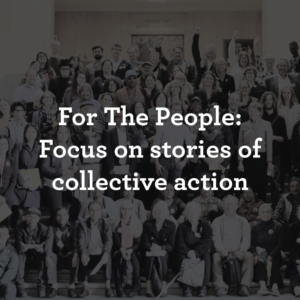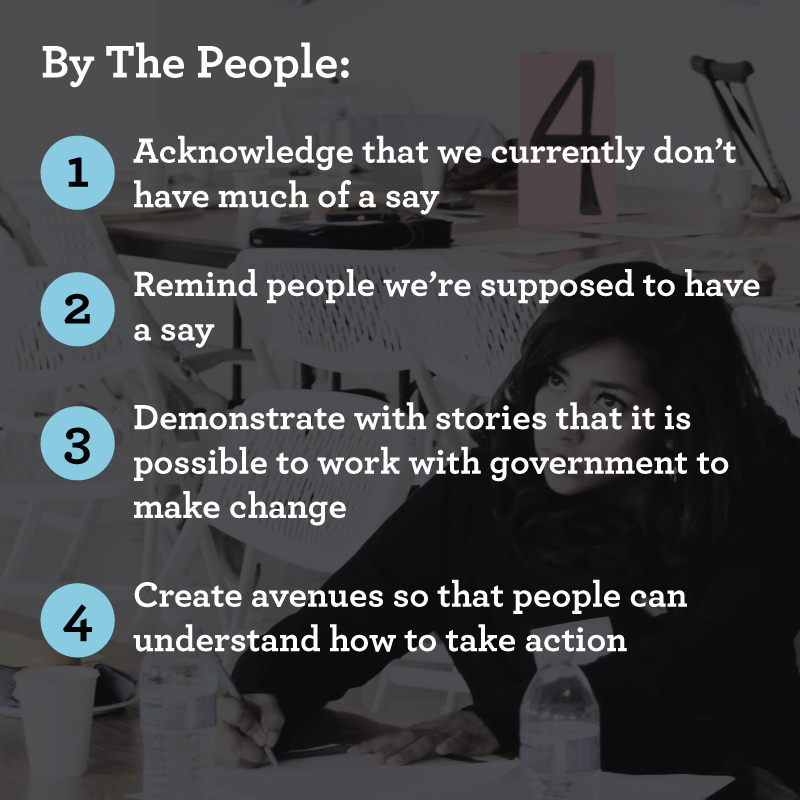 It’s difficult to watch the news recently and not feel a sense of despair. We’re angry and pained by violence and discrimination. We want all our neighbors to have homes, yet many are sleeping on the streets. Our friends and family spend days and nights worried about the bills, rather than enjoying their community. We wonder: how much say do we have in the government decisions and policies that could help? What can we do in Oregon?
It’s difficult to watch the news recently and not feel a sense of despair. We’re angry and pained by violence and discrimination. We want all our neighbors to have homes, yet many are sleeping on the streets. Our friends and family spend days and nights worried about the bills, rather than enjoying their community. We wonder: how much say do we have in the government decisions and policies that could help? What can we do in Oregon?
Most of us have a vague sense that we’re supposed to be able to change things. However, we often feel like subjects rather than participants. We don’t feel like agents of change in a thriving democracy. How do we break the barrier between the vision we have for our communities and the lack of agency we perceive? Researchers at The Topos Partnership and Indivisible have some answers in new research titled “Reclaiming Government for America’s Future.”
The research, conducted over more than a year, tells us that the path to empowerment begins by talking about a country that is both “for the people” and “by the people”; acknowledging that we currently don’t have the say in government that we’re supposed to have; highlighting how people have acted to make changes; and that there are tools for every single person to do more.
By guiding the conversation about government from one of helplessness to empowerment, we can begin to make the change that comes from residents having more say in our laws and how we spend public money.
Public Structures Sustain the U.S.
The research project began by asking people what they think of government. This part of the research was very similar to the strategy used ten years ago when Topos did their original work on Americans’ perception of government. Consistently the images that pop into people’s minds when you say “government” are those of bickering politicians, bureaucracy, and a limited “vending machine” operating model where you put money in and get services out. To help reframe the discussion, the early research suggested advocates highlight the “public structures” that are the backbone of American success and represent the core mission of government. These findings have been a feature of Neighborhood Partnerships’ advocacy trainings for several years.
We have put so much time into this research because we’ve seen how government can be a critical partner. In the recent past, Oregon advocates have secured historic funding for new homes, funding for emergency rent assistance, and renewed programs like the Oregon IDA Initiative which helps people save, start small businesses, own a home or go to college – just to name a few. Every day we are all beneficiaries of our public structures, but talking about public structures is no longer enough.
Subjects Not Citizens
The 2015-16 “Reclaiming Government for America’s Future” project painted a similar picture of American perceptions of government as the research ten years earlier did, with one major difference — people felt like subjects under the rule of government, not citizens in a thriving democracy. Americans felt that they had little say in government decisions and that often the government only served politicians and powerful interest groups.
 For The People: Stories of Collective Action
For The People: Stories of Collective Action
It’s important to note that this research is not trying to get “happy talk” about government. It isn’t about getting people to “like” government. And it certainly isn’t about ignoring the fact that government has been and still can be a tool for discrimination, violence, and the perpetuation of inequities.
The goal is to move the conversation from a powerless sense of frustration to a more productive place. Oregon is facing a housing crisis. Too few neighbors have emergency savings. Too few people of color own homes or small businesses. Too many children view post-secondary education as an unattainable dream. By employing some simple tactics, we can transform unproductive conversations to empowering ones, and change policy and investments. The end result will be thriving communities that are more equitable.
In order to achieve a transformative conversation, we must first focus on the collective benefit of people and communities working with government to tackle some of society’s biggest issues. Here’s a portion of an excerpt that people really responded to:
We sometimes forget that governing isn’t really about capitol buildings and politicians. It’s supposed to be about the laws and investments we make to benefit all of us and to create thriving communities. When we’re using government well, we create prosperity by building modern transportation and communications grids, and good colleges and court systems, and we make important laws about clean air, food, and safe workplaces.
But government only benefits all of us when we the people have control of its actions… This is too important to ignore. It’s up to each of us to step up and do our part to make sure government is in our hands and accomplishing what it is supposed to.
Researchers found that it isn’t necessarily difficult to get people to believe in the ideal mission of government. However, if you are able to get people to admit our public structures have value, people will quickly say: that’s how it’s supposed to work, but that’s not how it actually works.
At that point, we have to keep going.
By the People and Vote Plus One
It’s not enough to talk about how government is “for the people.” We also have to remind folks it is “by the people” as well.
In order for people to feel like they have a say in government we need to:
- Acknowledge that we currently don’t have much of a say
- Remind people we’re supposed to have a say
- Demonstrate with stories that it is possible to work with government to make change
- Create avenues so that people can understand how to take action
Among suggestions for helping people take action, researchers came up with the idea of talking about “Voting Plus One”, an idea that tries to help people understand that voting is not enough – we have to take a step or two beyond voting to really have a say in our government.
In the past Neighborhood Partnerships has held basic advocacy trainings. People were hungry for them. People want to know how and when to write a legislator. They want to know when a town hall meeting is being held in their area. They want to participate in the process of a bill moving through committees and floor votes. We just have to shape the way.
There’s a variety of ways advocates could employ “Vote Plus One” strategies. Action “by the people” can come in many forms – writing a letter, showing up at a meeting, sharing an experience or a story with a decision-maker are all good “plus one” steps. And we have many ways to communicate the pathways as well. Short trainings, webinars, written toolkits shared online, and more! If we all come together, we can find a way to craft solutions that are specific to each community and participation level.
The good news is in Oregon, we actually have pretty good tools for getting people engaged. It is pretty easy to identify your elected official, sign up for their email newsletters about your community, watch a hearing or track the progress of a bill.
Putting It All Together
Put all these ingredients together and you have the makings of a transformative conversation. When people first hear the Topos research they can be skeptical about the power that reframing can have on conversations about government, until they watch a “before and after” video of the messaging at work.
It is amazing to see how people in the research field tests can have one opinion one second, then completely turn around when exposed to a different message. See for yourself in these “before and after” videos from late 2015 and early 2016 in Oregon.
The video shows us that people’s immediate answers are defaults. They aren’t always thought through. When we open up the conversation and dig a little deeper, we really can move a conversation to a place of empowerment. Part of the power of these messages is that they are tapping into ideas we already have – we’ve just buried them below other stories about government. These changes are why we’re so excited about the potential with the “Reclaiming Government for America’s Future” project.
Oregon-specific results
Although broader trends in the research apply equally to Oregonians, researchers found Oregonians held several unique views. Many of these echo themes from the work that Neighborhood Partnerships did several years ago to create our “Oregon Narrative.” Not surprisingly, current views include:
- Positive attitudes toward our stewardship of the environment
- A belief that Oregon is an especially politically active state
- A divide between “Portland and everywhere else”
- Ambivalence about growth – for instance, regarding issues related to housing and density
Advocates College
We’re excited about applying this new research locally. And thankfully it is one part of a much broader set of resources and research that helps us think differently about how we speak about government and the role government should play in addressing the issues we care about.
Advocacy requires that we advance equitable solutions to complex problems and build a broad base of support. Strategic, research-based communication can help us reach our goals.
Neighborhood Partnerships has a series of upcoming trainings that aim to support you as you speak with legislators or craft messages about the issues you care about.
The first opportunity is the sixth cohort of what we call Advocates College. It is a 3-day training where you will learn the fundamentals of framing and messaging. You’ll learn about the brain science behind some of the best research and you’ll have many, many opportunities to practice your craft. You’ll also work with a cohort of people just like you who will act as a support system for many years.
There is also a condensed version of advocates college. During two shorter sessions, you’ll be exposed to some of the topics from the more in-depth training, you’ll get a chance to practice and you’ll be able to focus on either housing or asset building advocacy.
Learn more and apply on our strategic communications page.
Or download the “Reclaiming Government for America’s Future” report here or listen to the webinar.
Thanks to Metro, Meyer Memorial Trust, Multnomah County, Oregon Community Foundation and the Center for Oregon for helping fund this important work in Oregon.

